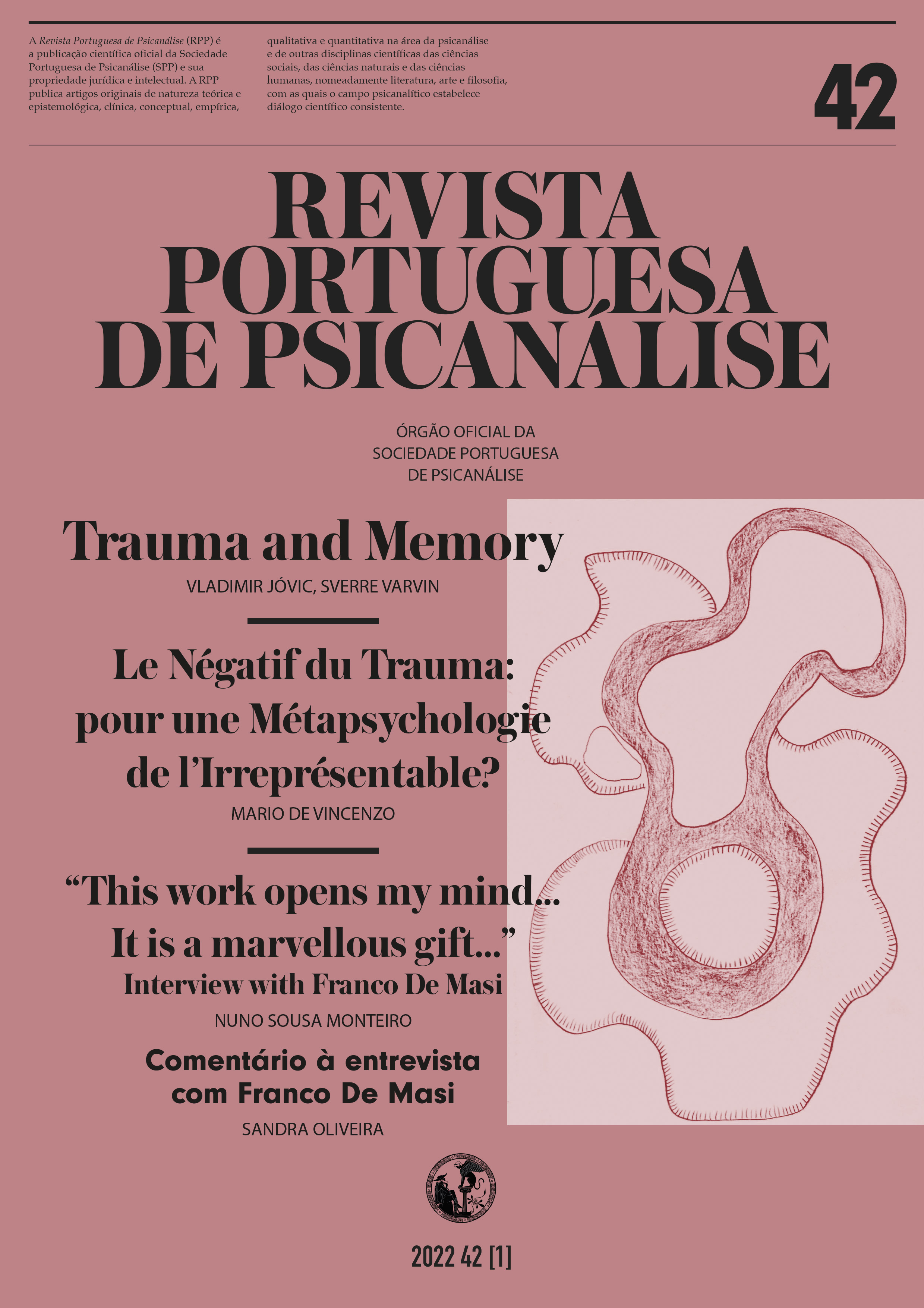Controversies on Psychoanalytic Psychotherapies: Is Psychodynamic Psychotherapy Effective for the Treatment of PTSD?

Resumen
Psychoanalysis is indispensable when writing and discussing traumatic stress, but in the treatment of these conditions it is ultimately disregarded. Since they are considered long-term treatments, therapies derived from psychoanalysis, such as Psychodynamic Psychotherapy (PDT), are not the first choice in health centers and clinics, which may be also a reflection of a scarcity of publications on its effectiveness. Through a literature review, focused on the effect size of PDT in the treatment of Posttraumatic Stress Disorder (PTSD), we have confirmed this scarcity. However, in the few studies conducted on this topic, findings have shown similarities between PDT and other therapies in reducing PTSD symptoms, both in post-therapy and follow-up assessments. The time of psychoanalytic psychotherapies is often pointed out as an obstacle, although studies have indicated that patients treated through these techniques present a continuous state of improvement.
Biografía del autor/a
Joana Proença Becker
Investigadora do Observatório do Trauma do Centro de Estudos Sociais da Universidade de Coimbra. Docente Faculdade de Psicologia e Ciências da Educação da Universidade de Coimbra.
Rui Paixão
Doutorado em Psicologia Clínica. Docente e investigador na Universidade de Coimbra, FPCE e CES.
Manuel João Quartilho
Psiquiatra. Docente na Faculdade de Medicina da Universidade de Coimbra.
Citas
- Abbass, A., Town, J., & Driessen, E. (2012). Intensive Short-Term Dynamic Psychotherapy: Systematic Review and Meta-analysis of Outcome Research. Harvard Review of Psychiatry, 20(2), 97-108. https://doi.org/10.3109/10673229.2012.677347
- Becker, J. P., Paixão, R., & Aragão Oliveira, R. (2020). Dynamic Psychotherapy: Is Time the Enemy that Proves to Be an Ally? in H. Boyd (Ed.), Psychotherapy: Perspectives, Strategies and Challenges (pp. 93-122). New York: Noa Science Publishers.
- Becker, J. P., Paixão, R., Silva, Simone S., Quartilho, M. J., & Custódio, E. M. (2019). Dynamic Psychotherapy: The Therapeutic Process in the Treatment of Obsessive-Compulsive Disorder. Behavioral Sciences, 9 (12): 141. https://doi.org/10.3390%2Fbs9120141
- Becker, J. P. (2017). Modern Hysteria? Somatization as the Discourse of Conflicts. 21st International Conference of the Association of Psychology and Psychiatry for Adults and Children - Proceedings, 19-25.
- Ben-Itzhak, S., Bluvstein, I., Schreiber, S., Aharonov-Zaig, I., Maor, M., Lipnik, R., & Bloch, M. (2012). The Effectiveness of Brief Versus Intermediate Duration Psychodynamic Psychotherapy in the Treatment of Adjustment Disorder. J Contemp Psychother, 42, 249-256. https://doi.org/10.1007/s10879-012-9208-6
- Brom, D., Kleber, R., & Defares, P. (1989). Brief Psychotherapy for Posttraumatic Stress Disorders. Journal of Consulting and Clinical Psychology, 57(5), 607-612.
- Busch, F. N., & Milrod, B. L. (2010). The ongoing struggle for psychoanalytic research: some steps forward. Psychoanalytic Psychotherapy, 24(4), 306–314. https://doi.org/10.1080/02668734.2010.519234
- Cabaniss, D., Cherry, S., Douglas, C., & Schwartz, A. (2011). Psychodynamic Psychotherapy: A Clinical Manual. Wiley-Blackwell.
- Coderch, J. (1990). Teoría de la Psicoterapia Psicoanalítica. Editoria Herder.
- D’Andrea, W., & Pole, N. (2012). A Naturalistic Study of the Relation of Psychotherapy Process to Changes in Symptoms, Information Processing, and Physiological Activity in Complex Trauma. Psychological Trauma: Theory, Research, and Policy, 4(4), 438-446. doi:10.1037/a0025067
- Fonagy, P. (2015). The effectiveness of psychodynamic psychotherapies: An update. World Psychiatry, 14(2), 137–150, doi:10.1002/wps.20235.
- Freud, S. (1976). Inibições, ansiedade e sintomas (1926) [Inhibitions, anxiety and symptoms]. In Obras Completas de Sigmund Freud Imago.
- Freud, S. (1996). Algumas Considerações para o Estudo Comparativo das Paralisias Motoras e Orgânicas e Histéricas (1893) [Some Considerations on a Comparative Study of Organic and Hysterical Motor Paralysis]. In Obras Completas de Sigmund Freud: versão standard brasileira, vol I (1888-1893). Imago.
- Freud, S. (2010). O Início do Tratamento (1913), Novas Recomendações sobre a Técnica da Psicanálise [On Beginning the Treatment, further recommendations on the technique of psychoanalysis]. In Obras Completas volume 10, Observações Psicanalíticas sobre um Caso de Paranoia Relatado em Autobiografia (“O Caso Schreber”), Artigos sobre a Técnica e outros Textos (1911-1913). Companhia das Letras.
- Freud, S. (2011). Psicologia das Massas e Análise do Eu (1921) [Group Psychology and the Analysis of the Ego]. In Obras Completas volume 15: Psicologia das Massas e Análise do Eu e outros Textos. Companhia das Letras.
- Landolt, M., & Kenardy, J. (2015). Evidence-Based Treatments for Children and Adolescents. In U. Schnyder, & M. Cloitre, Evidence Based Treatments for Trauma-Related Psychological Disorders: A Practical Guide for Clinicians. (pp. 363-380). Springer.
- Leichsenring, F., Klein, S., & Salzer, S. (2014). The Efficacy of Psychodynamic Psychotherapy in Specific Mental Disorders: A 2013 Update of Empirical Evidence. Contemporary Psychoanalysis, 50 (1-2), 89-130. doi: 10.1080/00107530.2014.880310.
- Levenson, H. (1995). Time-Limited Dynamic Psychotherapy: A Guide to Clinical Practice. Basic Books.
- Levi, O., Bar-Haim, Y., Kreiss, Y., & Fruchter, E. (2015). Cognitive-Behavioural Therapy and Psychodynamic Psychotherapy in the Treatment of Combat-Related Post-Traumatic Stress Disorder: A Comparative Effectiveness Study. Clinical Psychology and Psychotherapy. 23(4), 298-307. doi:10.1002/cpp.1969
- Quartilho, M. (2016). O Processo de Somatização: conceitos, avaliação e tratamento[The Somatization Process: concepts, evaluation and treatment]. Imprensa da Universidade de Coimbra.
- Sherman, J. (1998). Effects of Psychotherapeutic Treatments for PTSD: A Meta-Analysis of Controlled Clinical Trials. Journal of Traumatic Stress, 11(3), 413-35.
- https://doi.org/10.1023/A:1024444410595.
- Tran, U., & Gregor, B. (2016). The relative efficacy of bona fide psychotherapies for post-traumatic stress disorder: a meta-analytical evaluation of randomized controlled trials. BMC Psychiatry, 16(266), 1-21. doi:10.1186/s12888-016-0979-2
- Van Etten, M., & Taylor, S. (1998). Comparative Efficay of Treatments for Post-traumatic Stress Disorder: A Meta-Analysis. Clinical Psychology and Psychotherapy, 5 (3), 126-144. https://doi.org/10.1002/(SICI)1099-0879(199809)5:3%3c126::AID-CPP153%3e3.0.CO;2-H